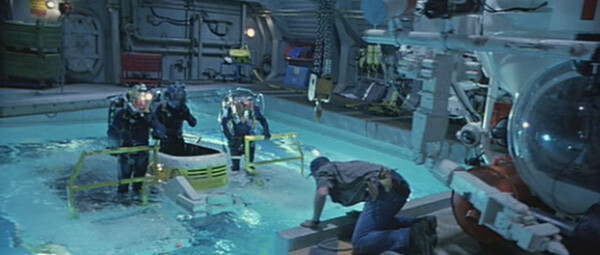The timing is….unfortunate, Daddy replied.
Former nuclear submarine officer Corley is telling tall tales.
When a submarine hull collapses, it moves inward at about 1,500mph (2,414km/h) - that’s 2,200ft (671m) per second
It starts from rest, initial velocity 0 m/s. The acceleration depends on the pressure, and so on the depth. The maximum velocity depends on how big the sub is.
The time required for complete collapse is about one millisecond, or one thousandth of a second.
Even for a vessel as small as Titan and at the pressure near Titanic (much deeper than any large navy submarine can go), it would take longer than that. Titan is smaller than I thought but it would still take several ms. You can get a feel for this from the Rayleigh collapse time for a bubble (Rayleigh-Plesset equation):
t~.91*a*sqrt(rho/p),
where a is the bubble initial radius, rho the liquid density, p the liquid pressure. I get about 6 ms for Titan near Titanic. I’d expect the actual time to be somewhat longer.
The air inside a sub has a fairly high concentration of hydrocarbon vapours.
That would be some bad air quality but seems to be untrue.
When the hull collapses, the air auto-ignites and an explosion follows the initial rapid implosion, Mr Corley says.
The air gets hot because it’s compressed, but there’s not much in it to ignite.
Human bodies incinerate and are turned to ash and dust instantly.
Assuming adiabatic compression of an ideal gas, temperatures reach ~1700 K when the pressure increases by a factor of 400 (a more realistic model would predict a lower temperature). But the volume of air at that point is a small fraction of what it was so most of the crew is in the water by then. The air will quickly cool as it loses heat to the water. A body getting hit with a propane torch for a fraction of a second is not going to turn to ash and dust.
I could have gotten some of this wrong, but I’m pretty sure I put more thought into it than the BBC guy.
I really like The Little Prince.
Nerd
Not the onion.

Does that change with pressure?
The problem here is that there’s only a cubic meter or two of gas in the sub. Call it three kg of air. The isochoric heat capacity of air at 1700k is 940 J/(kg*K). That’s the heat capacity for air at constant pressure. Since we heated the air up by squeezing it to 100 bar or whatever, that’s probably the right thing, I don’t know. So what’s potential to heat up shit from 3 kg of air 1400 K higher than room temperature?
940 J/(Kg*K)x1400 K x 3 kg=3,948,000 J
a calorie is 4.18 joules. So 944,497 calories. It’ll raise a million grams of water by one degree. A thousand kilograms of water by one degree. You’ve got like 400 kilograms of billionaire with the heat capacity of water being raised by a couple of degrees. No one’s getting vaporized.
How did they die then? Squashed by the walls of the sub that came down on them in under 30ms?
I think we say “went” down
Hopefully they died from the mechanical trauma of the hull crushing inward. If they didn’t I think they’d drown.
jfc at the thought of surviving the implosion
an immersive titanic tour
What if someone’s head just happened to be within the small pocket of highly condensed air
Would their ears pop?
Would the air quickly push their head back underwater?
So in the James Cameron movie The Abyss they have a deep water submersible oil rig that has an open pool of water where they launch minisubs and ambush Navy Seals.

They’re like 500 feet deep or whatever, I don’t know. This is possible because the air pressure in the rig is the same as the pressure of the seawater at that depth.
So it’d be like that, the air pressure of the bubble is at the same pressure of the seawater around it. Would ears pop? Probably, I don’t know. Would it push their head under water? No, for the same reason you can tread water in the Abyss moon pool the same as you can on the surface of the ocean.
They probably invited every rich person they could think of.
They surely would have died instantly if I think about it, the force would be like a bomb going off. It’s just not going to be vaporizing anything from heating up the air.
30 ms is on the very long end of estimates. But even at that, the average velocity of water or whatever hitting you would be about 40 m/s (radius of Titan is 1.2 m, I think). The terminal velocity of a skydiver is ~54 m/s, so we’re at 3/4 of that. Idk, we can ask @skydiver8 what she thinks would happen if you hit the ground at that speed, but my guess is you never know what hit you and you’re very soon if not immediately dead.

